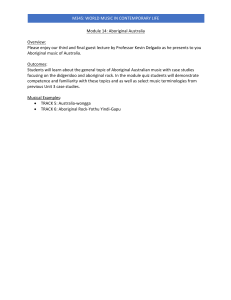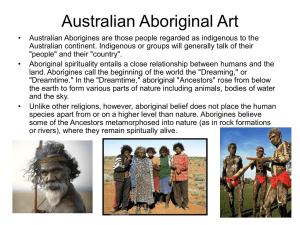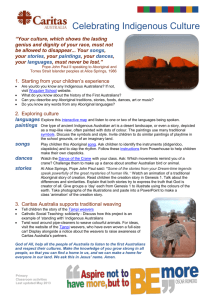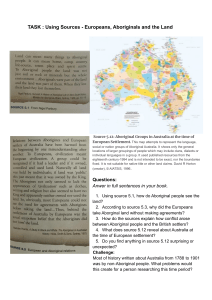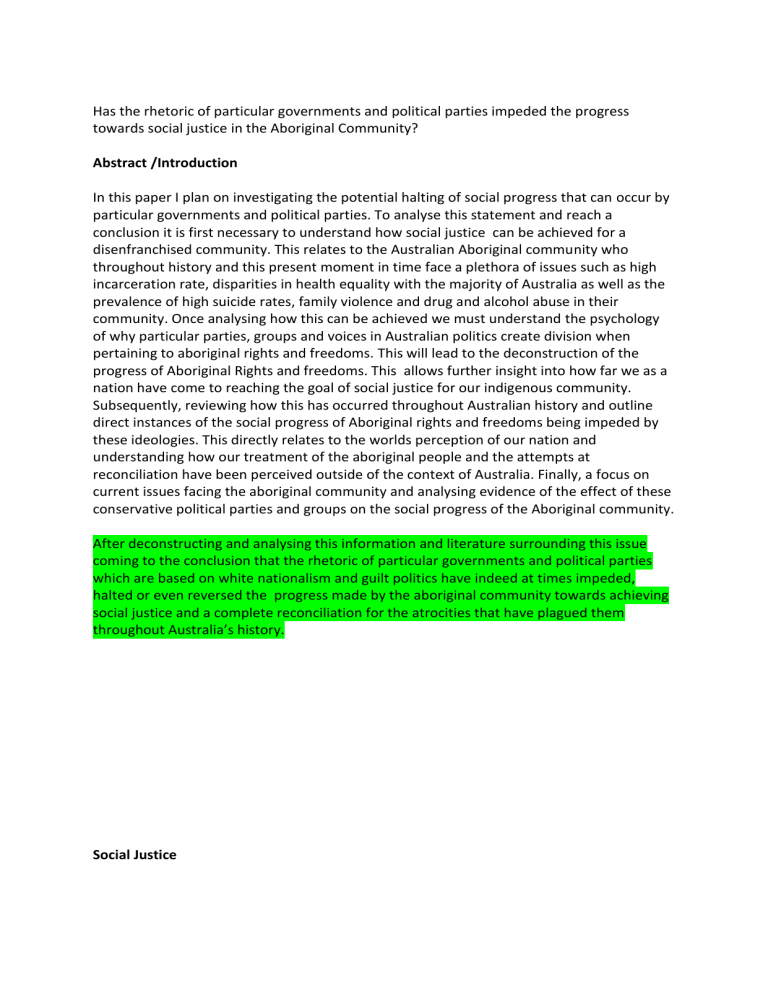
Has the rhetoric of particular governments and political parties impeded the progress towards social justice in the Aboriginal Community? Abstract /Introduction In this paper I plan on investigating the potential halting of social progress that can occur by particular governments and political parties. To analyse this statement and reach a conclusion it is first necessary to understand how social justice can be achieved for a disenfranchised community. This relates to the Australian Aboriginal community who throughout history and this present moment in time face a plethora of issues such as high incarceration rate, disparities in health equality with the majority of Australia as well as the prevalence of high suicide rates, family violence and drug and alcohol abuse in their community. Once analysing how this can be achieved we must understand the psychology of why particular parties, groups and voices in Australian politics create division when pertaining to aboriginal rights and freedoms. This will lead to the deconstruction of the progress of Aboriginal Rights and freedoms. This allows further insight into how far we as a nation have come to reaching the goal of social justice for our indigenous community. Subsequently, reviewing how this has occurred throughout Australian history and outline direct instances of the social progress of Aboriginal rights and freedoms being impeded by these ideologies. This directly relates to the worlds perception of our nation and understanding how our treatment of the aboriginal people and the attempts at reconciliation have been perceived outside of the context of Australia. Finally, a focus on current issues facing the aboriginal community and analysing evidence of the effect of these conservative political parties and groups on the social progress of the Aboriginal community. After deconstructing and analysing this information and literature surrounding this issue coming to the conclusion that the rhetoric of particular governments and political parties which are based on white nationalism and guilt politics have indeed at times impeded, halted or even reversed the progress made by the aboriginal community towards achieving social justice and a complete reconciliation for the atrocities that have plagued them throughout Australia’s history. Social Justice When attempting to achieve social justice for a disenfranchised community it is crucial to advance the systems and structures that challenge inequitable circumstances. In Australia there is a clear connection between colonisation and the atrocities of past governments to the Aboriginal Australian community that influence the current social injustices. (***)The first stage of repairing and reconciliation is from acknowledging these self-evident truths. Only after this can social progress can occur. (***)This begs the question, can conservative political movements reverse or impede social progress by questioning these self-evident truths? It is clear that social progress has occurred in Australia over time. The issue we face as a nation today is the disruption of this progress. We first must analyse the psychological reasonings for these ideologies . Additionally, its is crucial to understand the social and political progress of the Aboriginal community in Australia before deconstructing the impediment of its progress. Subsequently, identifying patterns that have emerged in Australian politics that have caused division in terms of Australia’s goal for reconciliation with aboriginal Australians is another way of identifying the potential halt to social progress and justice for the Aboriginal community. Nationalism & Guilt Politics: Psychological Study To understand the position of particular conservative movements that attempt at defending the atrocities of the past and reliving themselves of responsibility it is important we understand the psychology of guilt. Research in Western Australia has found that a there is a confronting amount of prejudice against Indigenous Australians. (***)It was found that a collective guilt which was linked to the past and present wrongs to the Aboriginal Australians predicted negative attitudes. (***) Social Psychological studies have provided evidence that claim that in a national context, confronting information about past atrocities that are considered immoral by members of the social group one belongs to poses a threat to social and national identity. (Roccas, Klan, & Liviatan, 2004, p. 131).This links directly to the idea that who we are as individuals is connected to our social and national identity. This determines the extent to how we feel collective guilt about the past. Essentially we want to feel good about the social group or in this particular case our nation we belong to. This leads people to develop particular justifications and reasonings for the past actions of our nation. This psychological study shows a direct correlation between the conservative movements which base their rhetoric on white nationalism and “guilt politics” and promoting a sense of nationalistic pride. These political parties and people cannot make the distinction between acknowledging the past atrocities of our governments and criticizing Australia. Aboriginal Social & Political Progress: With the introduction of particular Australian government policies, the rise of justice for the aboriginal community rose. The emergence of a cultural and political aboriginal movement is attributed to the events that transpired in the 1960s; this being the 1967 referendum and eventually the Aboriginal tent embassy on the lawns of national parliament in 1972. This is considered the inception of the Aboriginal rights movement and the beginning of the social progression we see today. This movement pushed for sovereignty, self-determination, land rights, cultural issues and much more (Anderson 2003). The achievements that have been made from the 1960s until now have been successful in the eyes of most. Although particular aboriginal authors such as (Anderson 2003) claim that even though there has been success, it has been limited. He explains how there has been success in the sense of land rights and other freedoms and rights of aboriginal people. He sees the limitations in the movement as the movements have garnered enough change for the political and social definitions of aboriginality. The sentiments of victimization of white Australians coming from conservative to extremist political parties grows. These groups claim loss of the white Australian identity. His perspective explores gives strength to the notion that the rise of conservative parties are impeding the social progression and growth of the aboriginal community and complete reconciliation. Conservativism Impeding Social Progress in Australian History Historically, numerous political parties driven by nationalistic ideals and guilt politics have used these ideologies to undermine the progress of social justice for Aboriginal rights and freedoms. To understand the claims made by Anderson we must delve into the issues that have been presented by the conservative movements in Australia. It is important to look back at our history and analyse the potential dismissal of Aboriginal rights. The dismissal of these rights can be attributed by sentiments put forth by particular politicians and the Australian government themselves. The Willingness of the Australian government to prevent the application of the racial discrimination act of 1975 (cmwth) from protecting indigenous rights highlights the fragility of those rights. (***) This extends to former Australian Prime Minister John Howards rhetoric surrounding the native tile amendment 1998 (cmwth). These events reveal the conflicting views of Australian in relation to the treatment and rights of Aboriginals in Australia. Prime Minister Howards proposed amendment would limit the rights of those native titled holders. His approach was informed by white nationalistic ideologies such as settlement myths and Terra Nulius. This rhetoric began to ignored legitimate claims that were presented in landmark high court cases such as Mabo.(***) This shows a legitimate holt and potential reversal to the progress of aboriginal rights and freedoms. This is clear evidence of conservative ideals and myths of white identity loss fuelling the decline of aboriginal social progress. This lead to the ‘poltiics of guilt’: claims that modern australians should not feel guilty or apoligse for the past actions or policies for australias government and people. Howards lack of context regarding the attroctiies of the past allowed him to make such bold statements without the post colonial context. (***) Australia’s International Perception: Treatment of Indigenous Australians Australia has faced criticism and scrutiny for their treatment of aboriginal people and the way modern Australia has attempted to remedy the long lasting effects of colonialism and the stolen generation. The Human Rights and equal opportunity commission created a report on the activities and legacies of the aboriginal protection board. It outlined the connection between the removal of indigenous children (stolen generation) and the effect it had on indigenous communities.(***) These effects include high rates of suicide, mental illness, family breakdown and substance abuse. This report shed light on the stolen generation and allowed many Australians to understand the deep impact the policies of former governments had on the aboriginal community.(***) This lead to a positive response from a portion of Australians as they felt it was necessary for the population to be aware of our historical past. In contrast those who embrace Australia from its colonial context and through a nationalistic approach came to the conclusion that, Australians should not feel guilt for the atrocities of the past. These perspectives were made apparent in the ‘Inquiry into the stolen generation’ where the current government stated that there was never a generation of stolen children and the emotional reaction to heart wrenching stories is understandable but that we cannot authentically evaluate decisions of the past. This shows a clear halt to the social progress of Aboriginal Communities fight for recognition of past mistreatment and has slowed any hope for a complete reconciliation. Additionally, Australia is reluctant to acknowledge the voice of international institutions, this has sadly damaged our reputation as a forward thinking and progressive country. Modern Issues: Lack of Treaty We have investigated the connection between collective guilt and nationalism. This is evident within particular conservative parties in Australia and with particular members of the government. There is a clear connection between these philosophies and movements which are protective of our White nationalist identity and the impediment of social progress and justice for aboriginal people throughout our nations history. This leads us to the modern day and analysing these ideals and how they are potentially obstructing progress on current issues. This extends to the pressing issue of Australia’s lack of a treaty recognising the Aboriginal people. Australia is the only commonwealth settler nation to not have a treaty which acknowledges land and rights protection and the ability to self-govern within their community. There are many aspects to analyse for the reasoning for lack of a treaty. Such as, the division on the meaning of the word treaty, Australia’s Reluctance to acknowledge aboriginal sovereignty, the lack of indigenous representatives and potential power imbalances. How are these concerns affected by the growing conservative rhetoric that has created a division on issues pertaining to indigenous justice or progress? The connection can be made from the fact that there is limited representation of Aboriginal Australians in the Commonwealth (National) Government. While particular political parties claim there is no efficient way to create a treaty the lack of an aboriginal voice allows these claims to go unargued. These conservative voices have such a strong impact on the potential progress for Indigenous Australians because their narrative is the only one being told. It is crucial for Australians to not allow this to continue by ensuring the Aboriginal community has enough of a representation in the federal government. Conclusion Throughout this research there are particular conclusions that the analysis of these literary sources and information has identified. It is evident that Australia’s dark history that relates to the past mistreatment and atrocities towards the aboriginal people of Australia has allowed the Aboriginal community to become disenfranchised. It’s clear that there has been major progress towards the achievement of social justice for the Aboriginal community. Although, the ideologies which are informed by nationalism, guilt politics and divisive rhetoric has shown to impede social progress throughout our history. The government’s willingness to overturn the racial discrimination act in 1975 and former Prime Ministers proposed amendment which would limit the rights of native title holders is clear instances of social progress being halted. Additionally, the dismissal of United Nations inquiry into the treatment of Aboriginal people by the Australian Government is a blemish on the reputation of our Nation and is an obvious indication of an social justice being impeded. It is now that even in present day Australia this divisive rhetoric which is based on nationalistic ideologies has not allowed us to progress to allowing the Aboriginal people of Australia to be recognised in our constitution. These finds show that the rhetoric of particular governments and political parties impede the progress towards social justice in the Aboriginal Community. Reference List Anderson, I, 2003, Introduction: the Aboriginal critique of colonial knowing. In Blacklines: contemporary critical writing by indigenous Australians pp. 17–24 Carlton, Vic.: Melbourne University Press. Gunstone, AR & Activating Human Rights Peace 2008, Conference Proceedings Byron Bay, Australia July 2008 2008, ‘Human Rights, Indigenous Rights and Reconciliation in Australia’, in Activating Human Rights and Peace: Universal Responsibility Conference 2008 Proceedings, NSW, Australia, pp. 1–8. Griffiths, K., Coleman, C., Lee, V. et al. 2016, How colonisation determines social justice and Indigenous health—a review of the literature. J Pop Research vol.33, pp.9-30 Sarah Maddison 2012, Postcolonial guilt and national identity: historical injustice and the Australian settler state,Social Identities, vol.18, no.6, pp,695-709 Jayaskera A, 2018. The value of treaty making with indigenous people in Austtralia, Perth Internaitonal Law Journal, University of Western Australia, International law society, vol. 3 pp.33-57 Roccas, S, Klan, Y, & Liviatan, I, 2004, ‘Exonerating cognitions, group identification and personal predictors of collective guilt among Jewish-Israelis. In N. Branscombe & B. Doosje (Eds), Collective guilt: International perspectives pp. 130-147). Cambridge: Cambridge Bashir, B. 2008, Accommodating historically oppressed social groups: Deliberative democracy and the politics of reconciliation. In W. Kymlicka & B. Bashir (Eds), The politics of reconciliation in multicultural societies pp. 48- 69 Oxford: Oxford University Press. B. Doosje (Eds), Collective guilt: International perspectives pp. 95-147, Cambridge: Cambridge University Press. Human Rights & Equal Opportunities Commission (HREOC). (1997). Bringing them home: Report of the National Inquiry into the Separation of Aboriginal and Torres Strait Islander Children from their Families. Sydney: Human Rights and Equal Opportunities Commission.
